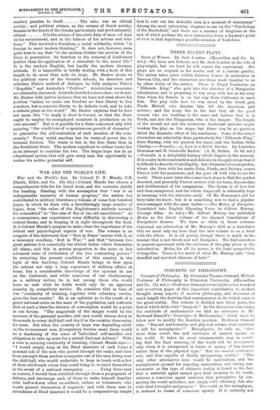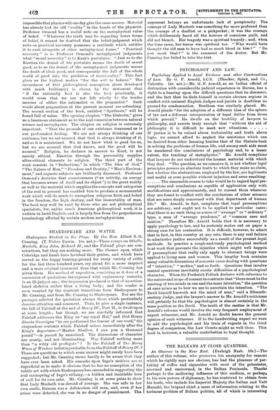CONCEPTS OF PHILOSOPHY.
Concepts of Philosophy. By Alexander Thomas Ormond, McCosh Professor of Philosophy in Princeton University. (Macmillan and Co. 17s. net.)—Professor Ormond covers in the seven hundred and seventeen pages of this important contribution to modern thought many aspects of modern philosophy, and discusses at much length the doctrine that consciousness in its widest sense is the great reality. The volume is divided into three parts, the first of which deals with "Analysis." In the discussion concerning the certitude of mathematics we find no reference to Mr. Bertrand Russell's " Principles of Mathematics," which must be taken now to modify the Kantian position. Professor Ormond asks : "Beyond mathematics and physical science what certitude is left for metaphysics ?" Metaphysics, he tells us, " does more than assert the real existence of mental agents in the world. It takes its most characteristic step in assert- ing that the final meaning of the world will be determined only when it is interpreted in terms of agency of the mental rather than of the physical type." But are mental existences real, and thus capable of finally interpreting reality ? "The only other alternative here would be materialism, and the metaphysical ground for rejecting materialism and taking con- sciousness as the type of ultimate reality is found in the fact that a material agent cannot give final meaning to its world, whereas a conscious agent exercises that prerogative by con- necting the world activities, not simply with efficiency, but also with ideal foresight and purpose." The world, on this metaphysic, is reduced to terms of conscious agency. It is certainly not impossible that physics will one day give the same answer. Material has already lost its old "reality" in the hands of the physicist. Professor Ormond has a useful note on the metaphysical value of belief. " Whatever the truth may be regarding lower forms of belief, it cannot be doubted that the belief-judgment which rests on practical necessity possesses a certitude which entitles it to rank alongside of other metaphysical forms." " Practical necessity" is to Professor Ormond's metaphysical judgments what "moral necessity" is to Kant's postulates. "Just as to the Kantian the denial of his postulate means the death of moral good, so to us the denial of the metaphysical judgments means the death of ideal good, and consequently the fall of the whole world of good into the perdition of irrationality." This fact gives us the highest motive "for the will to believe." The inwardness of this philosophical conception (here developed with much brilliancy) is shown by the statement that " if the rationally best is also the best practically, it would seem that we are not left wholly to the tender mercies of either the rationalist or the pragmatist." Such words about pragmatism at the present moment are refreshing. The second section of the book, entitled " Synthesis," will be found full of value. The opening chapter, "The Dialectic," gives us a luminous statement as to the real connexion between natural science and metaphysics. The chapter on religion is extremely important. " That the grounds of our existence transcend us is our profoundest feeling. We are not always thinking of our existence, but we are assured that God is always thinking of it, and so it is maintained. We do not know what is good for us, but we are assured that God knows, and the good will be secured." Religion, he declares in answer to Kant, is not merely ethical. Emotion through the personality supplies ultra-ethical elements to religion. The third part of the work consists in "Deductions," in which "The Idea of God," "The Nature of Man," "Freedom and Destiny," "Man's Environ- ment," and cognate subjects are brilliantly discussed. Professor Ormond's doctrine that consciousness (" an activity, an energy that becomes aware of itself and its object ") is the great reality as well as the material which supplies the concepts and categories of the real in general has enabled him to produce a monumental work which will do much to strengthen religious faith and belief in the freedom, the high destiny, and the immortality of man. The book may well be read by those who are not philosophical specialists, for, unlike much American philosophical work, it is written in lucid English, and is largely free from the preposterous terminology affected by certain modern metaphysicians.































































 Previous page
Previous page